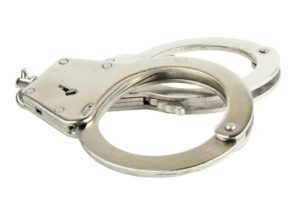 The Court continued: Here, Laboy lawfully pulled Evans over for suspected trespassing on hotel property that was a known hotbed for prostitution and drug activity. Evans had an active warrant for his arrest. Laboy was required to arrest Evans regardless of the reason and did not have to investigate the nature of the charge. Laboy placed Evans under arrest, performed a duly authorized pat down and, therefore, was in a lawful position when he first felt the bulge. There is sufficient credible evidence in the record to support the trial court’s finding that it was immediately apparent to the officer that drugs were present. Officer Laboy’s description of a “rocklike” substance, combined with the cash he found and the officer’s “hundreds” of similar encounters, merits the application of the “plain feel” exception. Thus, the officer here met both prongs of N.J.S.A. 2A:161A-1(b), and was permitted to perform a strip search on Evans. As compared to past cases, the officer here gave sufficient detail to justify his search. Although a graphic description is not needed to qualify for the plain-feel exception, the Court stresses that an officer must offer more detail than saying he felt contraband. The more detail, the better. The Court reverses the judgment of the Appellate Division and reinstates Evans’s convictions.
The Court continued: Here, Laboy lawfully pulled Evans over for suspected trespassing on hotel property that was a known hotbed for prostitution and drug activity. Evans had an active warrant for his arrest. Laboy was required to arrest Evans regardless of the reason and did not have to investigate the nature of the charge. Laboy placed Evans under arrest, performed a duly authorized pat down and, therefore, was in a lawful position when he first felt the bulge. There is sufficient credible evidence in the record to support the trial court’s finding that it was immediately apparent to the officer that drugs were present. Officer Laboy’s description of a “rocklike” substance, combined with the cash he found and the officer’s “hundreds” of similar encounters, merits the application of the “plain feel” exception. Thus, the officer here met both prongs of N.J.S.A. 2A:161A-1(b), and was permitted to perform a strip search on Evans. As compared to past cases, the officer here gave sufficient detail to justify his search. Although a graphic description is not needed to qualify for the plain-feel exception, the Court stresses that an officer must offer more detail than saying he felt contraband. The more detail, the better. The Court reverses the judgment of the Appellate Division and reinstates Evans’s convictions.
While it would seem obvious that an officer should not need to know the nature of a warrant before arresting, the underlying facts here suggest otherwise. The warrant at issue was for an unpaid balance of $6.50. The defendant ended up strip-searched and incarcerated over an amount of unpaid fines that he probably had in the change bin of his car.
Given the constitutional importance of this case, it was surprising that amici like the ACLU or County Prosecutor’s Association did not join in on either the initial appeal or the appeal to our state’s highest court. The head of the Public Defender’s Appellate Office should have done more to bring in outside counsel in this case.
